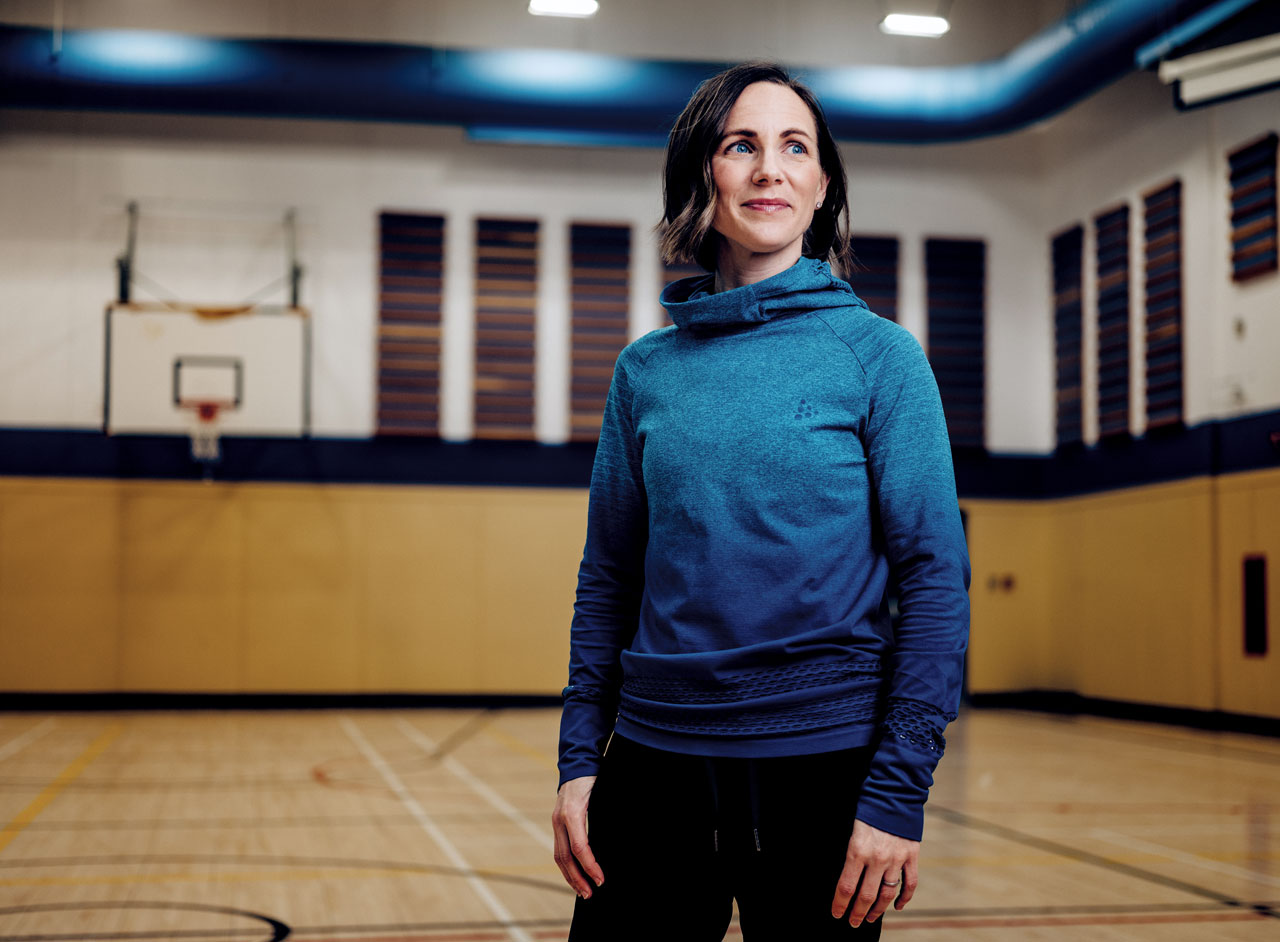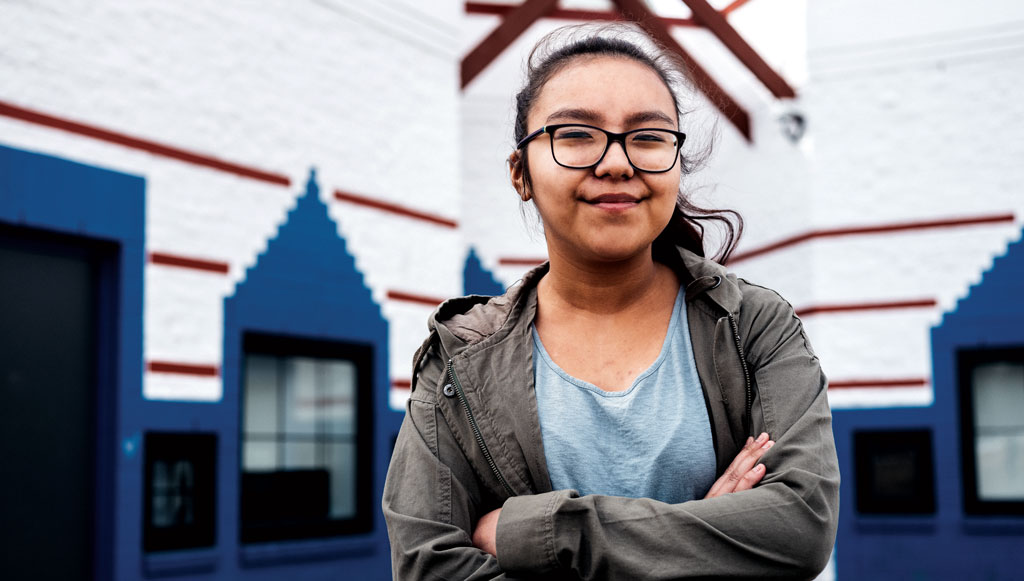
Kate Storey, associate professor in the School of Public Health. Photo by Cooper & O'Hara.
Distinguished Researcher Kate Storey has received $750,000 over five years from the Stollery Children's Hospital Foundation, through the Women and Children's Health Research Institute, to take her research to the next level.
Storey, an assistant professor at the University of Alberta's School of Public Health, focuses her work on supporting children and youth to be healthy and well-but she knows that facilitating a healthy lifestyle is about a lot more than telling kids to eat fruits and vegetables.
With a background in nutrition and health promotion, Storey recognizes that a number of influences, ranging from political and economic factors to emotional and intergenerational trauma, can affect a community's health and well-being.
Storey's Stollery Science Lab project is the implementation and examination of an initiative called the Indigenous Youth Mentorship Program (IYMP) in Alberta. First developed by partners at the University of Manitoba nearly a decade ago, IYMP is an after-school program that sees Indigenous students in Grades 7 through 12 mentoring elementary school kids within their community through activities that model healthy habits.
Storey and her team introduced IYMP to two Indigenous communities in Alberta in 2016 and the program is currently being expanded to four additional communities.
While the ultimate goal is to reduce the risks that lead to type 2 diabetes, which affects Indigenous communities globally at a higher rate than seen in the general population, IYMP is not about simply educating kids on the benefits of healthy eating or physical activity. The program is centred on Indigenous teachings and models of resilience, taking a holistic approach and using a broad definition of "well-being" while celebrating the voices and strength of youth.
"When working with Indigenous communities, we need to make sure that we use a decolonizing approach and recognize the power of culture," Storey says. "When we look at physical health, it can't be separated from mental, emotional and spiritual health."
Each IYMP session focuses on three components. The kids are offered a healthy snack, which can, but does not have to, consist of a culturally traditional food; mentors engage the younger kids in a game or physical activity, also often with a traditional element; and mentors include a relationship-building component. The content differs week to week and from community to community-Storey is very clear that the programming is to be driven by the communities, not by her own agenda. Before starting the after school program (which runs through the school year), youth mentors are coached by local "young adult health leaders" as Storey calls them, who draw on the knowledge of elders and others in the community to help plan the program.
"It looks very different in every community," Storey says. "There's no one size fits all." From a research perspective, the original Manitoba pilot program monitored the risk factors of type 2 diabetes among participants and did find that there was a significant improvement-compared to a control group who did not participate, the kids in the Manitoba study saw a decrease in average BMI and improvements in healthy dietary choices. While this is certainly a positive outcome, Storey is now more interested in how the program can ripple through to a number of different Indigenous communities in Canada in a way that supports a path toward reconciliation and decolonization.
"We're looking to understand how the structure of the program can be delivered by the community for the community, rather than as a research project," Storey says. "We're interested in what that transition of knowledge, resources and training looks like. Over the next five years we'll be moving away from the outcomes and looking at those kinds of questions."
Mentoring youth
Rain Arcand, Indigenous Youth Mentorship Program mentor. Photo by Cooper & O'Hara.
The primary goal of Storey's work is to improve the holistic health and well-being of children and youth, which means the teenage youth mentors are also benefitting from IYMP.
Rain Arcand is a Grade 11 student who started mentoring this year. She joined the program as a means of boosting her own confidence. A few months of being a mentor and she says that she wishes the program had existed when she was in elementary school.
"I joined because I wanted to set a positive impact on the youth in my community," Arcand says. "To support them and encourage them, to help them learn new skills, have confidence and just have fun."
Tatumn Rain, a Grade 10 student who also participates as a mentor, says it's the personal relationships that she's developed that have made her mentoring so valuable. Rain knows she'll come back again next year as a mentor to continue to pass that passion for building friendships and imparting knowledge onto the younger kids.
"You're not only a mentor, but you're also a friend and can be there for whatever they need. You can bring up their confidence and encourage them to do things," she says. "Also, the kids bring us a lot of joy. They make us laugh. They're really amazing."
The Stollery Children's Hospital Foundation is proud to support the Stollery Science Lab and its Distinguished Researchers program, through a $5-million investment over five years. Launched in 2018, this program is a joint initiative between the Foundation and the Women and Children's Health Research Institute at the University of Alberta, and its purpose is to give a boost to researchers addressing health issues affecting children and youth.
This story originally appeared in Heroes Magazine, Spring 2019 and is republished with permission from the Stollery Children's Hospital Foundation.
